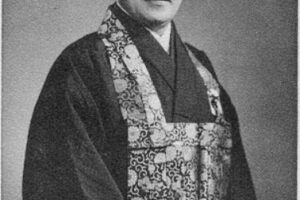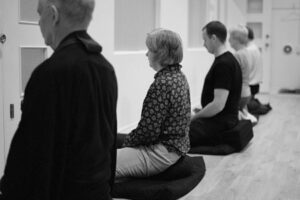
In my most recent Dharma Byte, published in May, I made some comments regarding the Precepts of Zen. I closed with the following:
The first Five Precepts, in the Matsuoka lineage, are given to candidates for Initiation into Soto Zen (J. jukai tokudo), while the Ten Precepts total are reserved for the first formal stage of training as a priest, which we call Discipleship (J. zaike tokudo). Other lineages differ. But the receiving of Precepts is regarded similarly in all sects of Zen, as a living act of commitment to examining our life, and penetrating to its depths.
The meaning of the Precepts evolves over time, maturing with our practice. Like everything else in Zen practice, “The meaning does not reside in the words but a pivotal moment brings it forth” (Precious Mirror Samadhi). Hopefully, for those of you who have gone through Jukai in the past, this has become clear. For those of you who are planning to do so this year, may it come to pass soon.
The only other point I would like to make about the Precepts, is that they are not something new or different, really nothing special. You already harbor precepts about killing, lying, stealing, et cetera, which may be inchoate, and may not be fully conscious. When you go through the initiation ceremony, it raises your own precepts to the level of conscious awareness, perhaps for the first time. You may find that your preconceived precepts do not match those of Zen Buddhism. In the difference you will find the critical sameness.
In this follow-up, I want to suggest that you consider undergoing Jukai in July, if you have not already done so. And if you feel you are ready to commit to a more serious practice of Zen.
This last sentence is, of course, an oblique reference to The Harmony of Sameness and Difference, by Shitou Xiqian (J. Sekito Kisen), one of three Chinese, or Ch’an, chants in the Zen liturgy. It is a wonderful dissertation on the mind-boggling distinction-without-a-difference that we associate with our dualistic notions of reality. We chant it each Monday morning after zazen:
Grasping at things is surely delusion
According with sameness is still not enlightenment
So, sorting out the “Myriad Things” or “10,000 Things” into the usual categories the mind conjures, however useful, represents a fundamental kind of delusion. But merely intuiting the sameness underlying the obvious differences in things is not, in itself, enlightenment. According to Matsuoka Roshi’s “360 Degree” model, this is realized at 180 degrees, only halfway around the circle, from our beginning Zen practice at point zero.
But nonetheless, a kind of insight is gained here, into the non-duality of things; including the fact that all things of the Universe share the traits of impermanence, insubstantiality, and imperfection. So too with our Zen practice. If we try to “perfect” our practice, we may only be conforming our understanding of Zen to a preconception, whether conscious or subliminal.
The decision to formalize one’s practice—by taking the Precepts—is a deeply personal one. It will not necessarily have a positive result on your actual practice of Zen. We do not make it a blanket recommendation. Of course, we insist that Zen is for everyone, but at the same time, we recognize that not everyone may be ready for Zen. Making the decision to undergo Jukai may not be appropriate for you at this time in your development in Zen.
However, if you feel you are ready, this is the time to take the plunge. We offer these ceremonies only once a year, at the end of our annual Precepts Retreat, following the Silent Thunder Order Conference. You are invited to attend the full retreat, or any part of it, and to join in the ceremony the following Sunday. You will be part of the Class of 2018 if you do so.
It may be useful to regard this decision in the light of Sekito Kisen’s dissertation on the harmony of difference and sameness, the resolution of the non-duality, of apparent opposites. Later in the poem, he revisits the central point:
Existing phenomenally like box and cover joining
According with principle like arrow points meeting
So, we may take from this that, while according with sameness is still not enlightenment, it has something to do with according with principle. This may refer back to a statement attributed to Bodhidharma—the last Zen Patriarch in India, and the first in China—that it cannot be argued that practicing zazen is necessary to enlightenment; it is only necessary that one grasp the “vital principle” (Red Pine: The Zen Teachings of Bodhidharma). Of course, for most of us, in order to grasp the vital principle, it turns out to be necessary that we spend a lot of time in zazen. But this is because we are so entangled in the differences, or entranced by the samenesses that we think we perceive, that it takes a long time to untangle the webs we have woven.
If we understand that this insight does not exclude the real world of our everyday understanding, where boxes and covers join, if they are made correctly; but rather that the insight transcends ordinary understanding. This insight includes a principle that is seemingly as impossible as two arrow points meeting in midair—what are the odds? The resolution of opposites (J. mokurai) in our daily lives is not as simple as it may appear.
The decision to take the Precepts is like this.
If we have attachments to the idea, we may be “grasping at things.” If we give it no thought at all, we are perhaps erring on the side of “according with sameness.” Like most things in life—such as decisions around career choices, majors and degrees pursued in college courses, and such life-changing events as marriage, bearing children, and divorce, we can overthink it, or plunge headlong into it, without much consideration. Either way, the decision results in consequences, some of which can be dire, determinative, and even karmic, in nature.
But Jukai does not imply a commitment to living a Zen life in a prescribed way. It only suggests that you have come to recognize that something is missing in your life, and that you may have found it in Zen. Undergoing Initiation, receiving a Dharma Name and vestments (J. wagesa and juzu beads), and a certificate of the ceremony, merely cements this in your mind. The recitation of the first Five Precepts reminds you of these guidelines handed down for centuries, since Master Dogen first formulated them for his Japanese students after returning from China. As I often say, we observe these precepts by breaking them; that is, they come to conscious awareness when we realize that we are not following them in daily life. Jukai then becomes not merely something that we once did, but something that we do, over and over.
This repetition factor is what makes the Precepts work, that is, take root in our lives. Similarly, repetition is the key to how zazen finally comes to have its effect on our worldview. If this rooting of precepts in our lives could be accomplished without repetition, everyone would be enlightened. Would that it were so easy. Zen may be simple, but it is not easy. The stubborn nature of what we bring to the process is the reason why. It is not the fault of Zen.
So, when we undergo initiation into the mysteries of Zen, it is both a matter of not grasping at things, and not merely imagining that nothing has changed, i.e. still according with sameness. It is also an everyday, practical matter of cementing our relationship to the Zen community, or Sangha, “like box and cover joining.” But at the same time, it is something that cannot be so easily dismissed, or categorized. It is “like arrow-points meeting.”
After all, it has taken everything in the universe, up to date, to bring about this confluence of your own particular life and karmic line, with that of Zen’s legacy; and, not incidentally, this particular lineage of Matsuoka Roshi. The latter is less important than the former, which could come about through another lineage; though your coming to this decision by way of our agency cannot be considered a mere accident.
Matsuoka Roshi dedicated his life to the propagation of Zen, specifically to America, and I, as well as the hundreds of my students, along with thousands of members of the Affiliate network of the Silent Thunder Order (after mokurai, connoting “silence is thunder”), have benefitted from his pioneering efforts, before and after WWII. He thought that the future of Zen in the world was to be found in lay practice, and that it would find its rebirth in America.
I began practicing and training with O-Sensei in the 1960s, and was part of what has been called a blossoming of interest in Zen that occurred in that generation. In the intervening years since, we established Atlanta Soto Zen Center in 1977, having just passed our 40th anniversary last year and have introduced our peculiar brand of lay practice to innumerable people. We do not keep track of them, nor do they necessarily stay in touch with us. But they are out there, and once exposed to this particular brand of Zen practice, they cannot forget it.
So for you, it is the same—but different. If you undergo Jukai this year, it will be but a blip on the screen of your Zen life. It may lead to a more formal commitment later, such as taking on the responsibility, and entering upon the formal Path, of a Disciple of Zen Buddhism, and perhaps later on a Priest. But again, we do not recommend this. It is not our choice to make. But if your life moves naturally in that direction, we are prepared to accommodate you with the proper training and our credentialing program.
If, on the other hand, your initiation into Zen Buddhism through Jukai is as far as you go in terms of formalizing your practice, that may be for the better. Either way, the outward expression of your practice is like “box and cover joining.” The inner reality, for you, is where you will find the “arrow points meeting.” The two are not co-dependent.
As for myself, when Matsuoka Roshi took me aside one day and said, “You must become a priest—not for yourself but for others,” I did not take his meaning at the time. I can honestly say that I still do not understand, completely. But I have no regrets, and have never looked back. Indeed, I am profoundly grateful for that which he could never give me.
I suggest that you approach this decision in your life in like manner. If you make too much of it, you do not understand. If you treat it casually, you do not understand. But then, even Buddha did not understand. It is beyond understanding.








